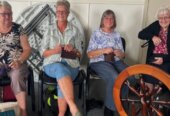A barbeque has brought elder abuse to the attention of Kihikihi bowls players.
“It is so they can actually realise what the abuse is, and can recognise it when it happens,” said CommSafe community safety officer, Mandy Merson.
Merson, and Violence Free Waipā coordinator Ruth Nicholls, organised the lunch event.

Mandy Merson and Ruth Nicholls are highlighting issues around elder abuse.
It catered for a Kihikihi Bowling Club winter tournament yesterday, and recognised World Elder Abuse Day (June 15) a week early.
“They’re in that age group that we need to speak to,” said Merson.
They provided the bowlers with the resources to help identify elder abuse, and gave them guidance on seeking help if they, or a loved one, did encounter it.
Elder abuse is classified as any act that causes harm to an older person. It could be neglect, or any kind of psychological, physical, financial, or sexual abuse.
According to the Office for Seniors, one in 10 older people in New Zealand will experience elder abuse.
“Sadly, the abuse often starts with their family or friends,” said Merson.
She gave an example of somebody falling over or getting sick, and then needing to rely on somebody close to them for support.
“They could give their Eftpos card to a neighbour, to buy groceries or something. What happens then is people sadly take advantage of that situation, and their money suddenly starts disappearing… They don’t realise they have been taken advantage of until it is too late, because they just trust people.”
She said that victims of elder abuse are typically reluctant to talk about their experience, because they could be embarrassed of what happened or are dependent on their abuser in some way.
However, she said the emotional impact of elder abuse is very noticeable.
“You actually see that their whole demeanour changes and they get full of anxiety,” Merson said.
“It just takes their whole trust away.” She doesn’t believe that there is enough education on the subject, and said if more people took notice of the signs, a lot more incidents of elder abuse would be detected.
“Sadly, everyone is so busy… I don’t think it is in our vision to see it.”
Elder abuse can be difficult to detect because it usually involves some form of deceit. Merson’s advice for anyone who is unsure whether or not it is happening, is to talk to someone about it.
“Preferably somebody who isn’t related to the situation they’re in,” she said.
“People don’t think it is a police issue, but it generally ends up being a police issue, especially if it is a financial situation”
The Office for Seniors have resources available online to address concerns of elder abuse, as well as a free and confidential 24- hour hotline. Their Elder Abuse Response Service can be contacted by calling 0800 32 668 65








